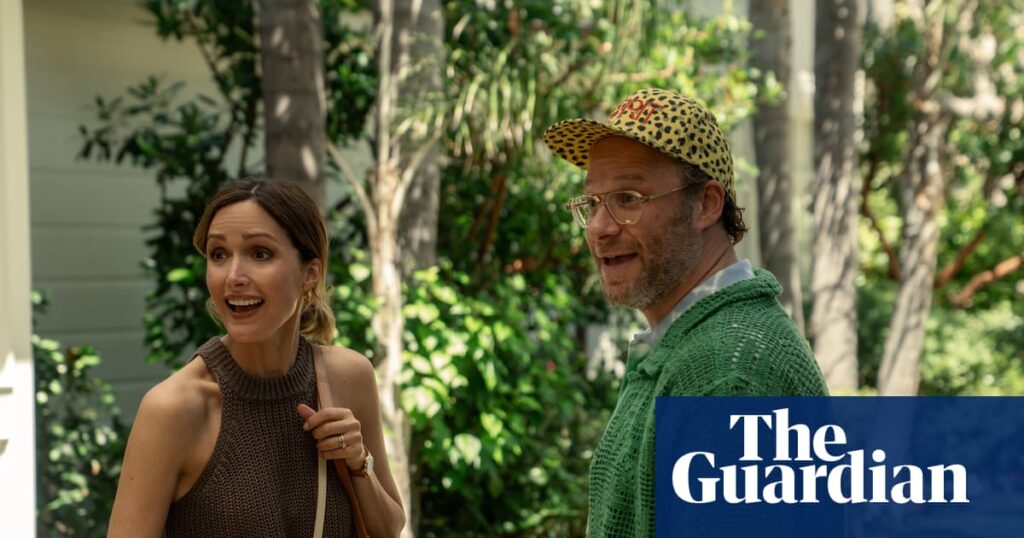When the time comes to look back on this part of Seth Rogen’s career, The Studio is destined to dominate everything else. This makes perfect sense. He co-created it, co-wrote it, stars as its lead, convinced the great and good of Hollywood to be in it with him and directed it with such a vaulting sense of ambition that, when it won more Emmys than any other comedy in history a few weeks ago, nobody even flinched. The Studio is the show that has cemented Rogen’s status as a comic visionary.
However, if I might offer a small footnote here: Platonic is pretty great, too.
True, Platonic will almost certainly go down as Rogen’s other show. It’s far less striving than The Studio. It’s not full of dazzling one-take scenes, nor is it jam-packed with A-list guest stars. It has far less to say about the state of anything at all. But Platonic’s second season is wrapping up, so now is the time to state that, pound for pound, it may actually qualify as his most enjoyable show.
If you’ve yet to see it, Platonic is a sitcom about two people (Rogen as Will and Rose Byrne as Sylvia), who have to navigate the difficulties that come with being old friends with someone of the opposite sex. There’s a bracing lack of sexual or romantic undercurrent to their friendship, but that doesn’t stop their romantic partners from occasionally becoming suspicious of their motives. The bigger problem is the co-dependency that has formed between them over the years, which intermittently rears up and forces them to act like petulant teenagers when they’re together.
If that sounds low stakes, that’s really the intention. Once the premise has been established (which takes an episode and a half), Platonic simply becomes an opportunity for Rogen and Byrne to hang out and be as charismatic as possible. And it turns out that is spectacularly charismatic. Rogen, to some degree, plays a version of Seth Rogen we have seen onscreen before. He’s juvenile, unambitious and trapped in a state of arrested development. This is something he has always been good at. Rose Byrne, on the other hand, is an absolute revelation.
When Byrne is onscreen, it’s difficult to look at anything else. As the more mature of the partnership – she is married with children, while Rogen is not – you’d expect her to be the straight woman, but in reality she is an explosion of heightened reaction shots. In every scene, her face spirals through a spectrum of microexpressions, landing on the least-expected choice. Her timing is pin sharp. She has the broad physicality of a silent movie star. I recently found myself watching 28 Weeks Later, and found myself bored to tears by her staid performance, but to see her so effortlessly outshine comic performers of the highest calibre in Platonic is to wish that she had always done this sort of thing.
This goes double for the current season. Overall, it’s a little more fractured than the first – a plot about Rogen’s new fiancee runs out of steam after a handful of episodes, and gets replaced by more generic sitcommy fare – but Rogen and (especially) Byrne sell the hell out of it. You want to be in their company for ever.
In a perfect world, Platonic would run for years and be as popular as Friends. That’s not likely to be the case, though. By all accounts, The Studio is not just the bigger show, but the project that requires the most of Rogen. As that grows, there will be less room for this in his life. And, knowing how television works, the longer Platonic stays on the air, the harder it will be to resist throwing an element of Ross and Rachel-style will they, won’t they into the mix.
This would be terrible. The tension from Platonic comes from those around Rogen and Byrne, and their conspiracies about a romance. The first season revolved around Byrne’s husband’s insecurities about the pair, and the best parts of the second mirror that from the perspective of Rogen’s fiancee. But Rogen and Byrne remain an impenetrably oblivious bubble. The instant there is so much as a lingering glance between the pair, the show will be dead. Platonic is not a “will they, won’t they”. It is a “please don’t”.
If Platonic were to end now, there are ostensibly plenty of other shows with which to soak up the loss. It falls neatly among Apple’s stable of low-effort comedies about nice people being nice to each other. Ted Lasso is a little like that. Shrinking is a little like that. Stick is a little like that. But Platonic is too twitchy and restless to be categorised like that. For all their chemistry, the two leads are spiky and prone to self-sabotage – one episode is purely about Byrne having to parent after ingesting ketamine – which puts it a peg above the competitors.
Still, right now the conversation is all about The Studio. And, again, this makes sense. As a piece of television, The Studio is more impressive than Platonic. But Platonic is so much easier to love. Let’s hope there continues to be room for both of them.
Platonic is on Apple TV+. The finale airs on 1 October.

